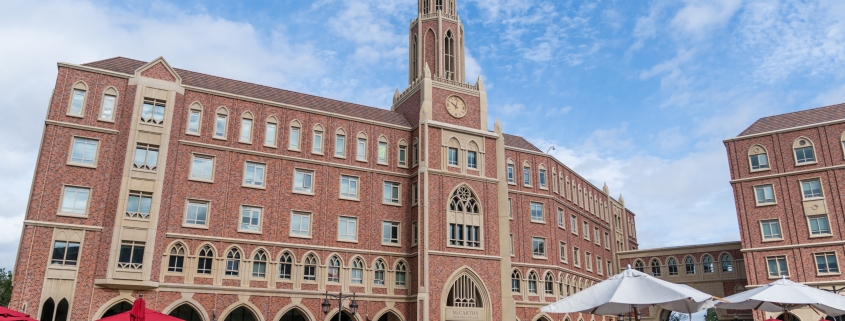USC Village businesses limited amid the coronavirus

Once swarming with students lounging on sun-soaked couches, stumbling out of Trader Joe’s laden with groceries and lining up for midday caffeine fixes, USC Village now stands empty, with the exception of a few mask-donning patrons scurrying to buy essential goods. With classes moved online and campus now deserted, many businesses have been forced to close temporarily or cut their operations drastically.
Of the 33 retailers in USC Village, only 14 remain open. Those that remain open have reduced hours, enacted safety precautions and cut down on employees to accomodate for reduced foot traffic, some manning their businesses with one- or two-person crews. All restaurants have suspended dine-in options, limiting orders to takeout or delivery.
“USC Village is here to serve our neighbors during this unprecedented crisis and will remain a resource to the public,” the USC Village website states. “For your safety and the safety of others, tenants at USC Village enforce social distancing measures, including separation of individuals by at least six feet and staggered entrance to limit the numbers indoors.”
To maintain social distancing, Dulce Cafe set up a table in front of its shop to limit customer-employee interactions and possible contamination within the restaurant.
“It kind of feels like a lemonade stand in a way,” manager Allen Mariano said. “It’s difficult trying to create a sense of welcoming.”
While Dulce has not had to lay off employees, uncertainty over the length and severity of the coronavirus crisis presents an ever-looming stressor for management.
“I’m not even the owner, but I definitely take ownership because this place definitely grows on you and it definitely feels like family,” Mariano said. “Of course, I worry about everyone who has to pay rent and has to put food on the table, and I think that’s the biggest element of stress I have: making sure everyone’s taken care of.”
Some businesses, however, have reduced the number of employees working in their stores. Without the need for waiters to serve dine-in customers, some restaurants, like Kobunga Korean Grill, only have two employees working at a time, with one person taking orders and the other preparing food in the back.
Many others, like Wahlburgers and Greenleaf Gourmet Chopshop, have had to close their doors until students return to campus. Citing loss of revenue, the USC Village Wahlburgers closed indefinitely Tuesday with employees expected to be rehired once ot reopens, according to Wahlburgers general manager Brandon Sharpe. Twenty-five hourly employees from the USC Village branch of Greenleaf have been temporarily laid off, and 11 managers from both the USC and Hollywood branches have relocated to the three stores that remain open.
“Unfortunately, we don’t have as much — almost zero — in-house sales, so all of our sales have to come through takeout or delivery or catering,” said Will Hotchstatter, a manager at USC Village Greenleaf. “Recently we’ve been doing catering for the Children’s Hospital in Hollywood. So, that has been taking up a lot of our sales as well as just making sure that we’re able to give back to the nurses and doctors and everyone who has been working so hard toward helping the community.”
With Gov. Gavin Newsom’s implementation of the statewide stay-at-home order March 19, other businesses have seen a shift in their primary source of income as consumers search for new ways to occupy their time.
“We’ve been selling a lot more bikes and doing a lot less repairs,” said Johnny Oball, head of service and retail for Solé Bicycles. “We do a lot of direct-to-consumer sales online, and we’ve seen a tremendous increase of online sales. We’ve been doing really, really, really well online and kind of just breaking even in store, so it’s a little different with us because we are still essential being a bike shop, and cycling [is] still an essential activity.”
As service-based retailers see a drastic reduction of patronage, many small businesses worry about their long-term survival. Emily Garber, the owner of Apple Doc, the Mac repair clinic in USC Village, said that traffic has been reduced to less than a quarter of their normal level.
“It is a struggle to make payroll and pay for parts,” Garber said. “We’re in this time where there’s not much support for business owners. There’s just a level of uncertainty and [we’re] just doing our best to stay strong and make it through this time and support our customers.”
Brian Wilson, the executive director of real estate development and leasing at USC, said he was encouraged that select businesses have been able to continue serving the community and providing a source of income for their employees in an email statement to the Daily Trojan.
“Like other landlords in Los Angeles and around the country, USC is evaluating each tenant based on its circumstances and will make a determination about how to respond on that basis,” Wilson wrote. “We have been communicating with our tenants and have identified resources available for them to support their businesses.”
Garber said she has not received clear directions from the University on how it will support her business and hopes USC will communicate a plan soon. She worries that with no end to the coronavirus pandemic in sight, many small businesses will have to permanently shut their doors.
“All of us in the Village invested a lot, a lot of time and money creating our business, because we were given an empty spot, basically, when we moved in, and we built what we have,” Garber said. “So all of us … want to make it work, and work with University to help us all stay viable … A lot of us here really want to be a part of USC for the long term.”

